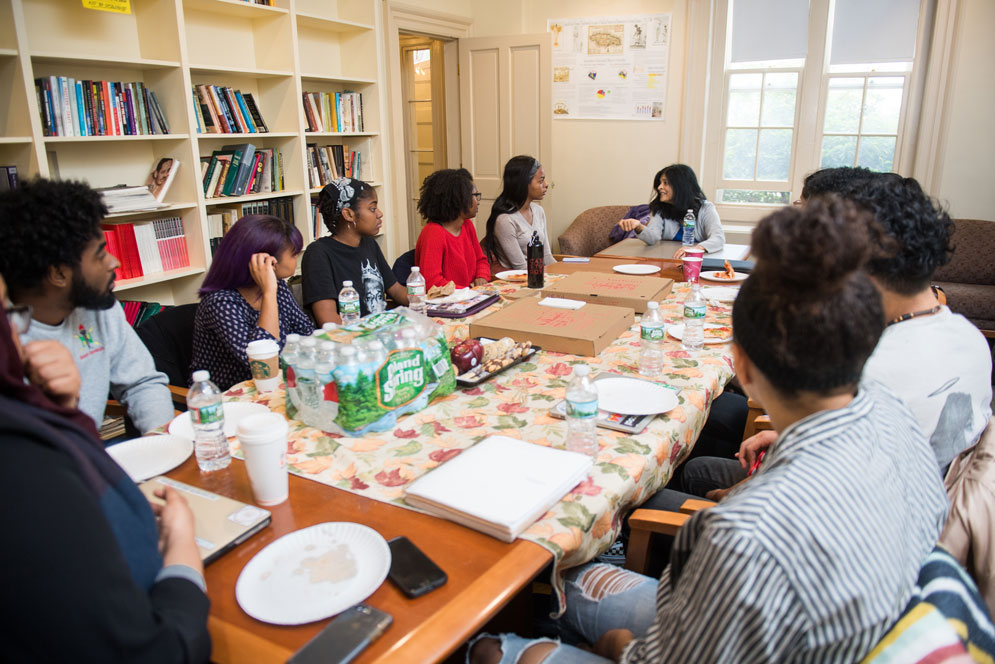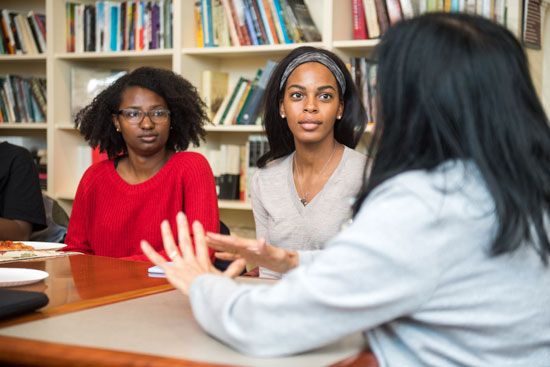Connecting Students of Color
Launched and led by students, the Minority Connection Initiative seeks to foster community

Suchi Gopal, a CAS professor of earth and environment (at table’s head), was a recent guest at a Minority Connection Initiative’s Professor Office Hours event, where she answered questions about her career and discussed challenges women face in the workplace. Photo by Cydney Scott
Kevin Smith returned to BU for sophomore year only to find that five of his peers and classmates had not; the African American men had all decided to switch to other schools, prompting Smith to ask a few questions.
“I did a little investigating, and it seemed they were unhappy with the atmosphere of the University as a whole,” says Smith (ENG’17). “It led me to believe there were certain holes that needed to be filled.”
So junior year, he cofounded the Minority Connection Initiative, now in its third year and making an impact across campus. The student-led organization has about 300 members on its email list and an average of 30 attend its events, aimed at connecting and strengthening the relationships among BU students, faculty, and staff who identify as racial minorities. The events also promote and share information on the resources available to these students.
“Our events try to start a conversation and break the ice,” says Minority Connection Initiative president Hodan Hashi (CAS’20). “Many of us went to predominantly white high schools, so we are used to not seeing students and professors who look like us, and for those students who did attend more integrated high schools, BU is a bit of a culture shock. In college, students grow the most, and so they look for people they can relate to.”
“I think it’s imperative for all students to feel themselves connected to peers and mentors during their college tenure,” says BU senior diversity officer Crystal Williams, the University’s first associate provost for diversity and inclusion. “And in the case of people from underrepresented groups, it can be especially important to be in community with people who have had similar experiences, triumphs, challenges, and who may be particularly well suited to understand the cultural and social contexts from which they emerge.”
In recent years, the University has put an emphasis on diversifying the BU community and creating a culture of inclusiveness, and these issues will continue to be addressed as a task force drafts the University’s next 10-year strategic plan. In this year’s incoming freshman class, 18 percent self-identified as Asian American, 6.9 percent as Black/African American, 11.9 percent as Hispanic American, and 22.1 percent as International. The numbers are similar to when this year’s graduating seniors entered as freshmen in 2015: 15 percent self-identified as Asian American, almost 6 percent as Black/African American, 12 percent as Hispanic American, and 25 percent of the class hailed from a foreign country.
The Minority Connection Initiative is among the more than 40 multicultural groups on campus, including the African Students Organization, the Howard Thurman Center for Common Ground, Alianza Latina, the Minority Engineers Society, the Asian Student Union, the International Society, and Umoja (BU’s black student union).

Earlier this semester, the Minority Connection Initiative invited many of these groups, as well as others, to its first Students of Color Welcome Celebration—a night of networking, group information signups, speakers, and food.
“We all support each other, and we’re all somehow intertwined… Everyone look around at all these people—they are going to help you. That is the point of MCI,” Minority Connection Initiative vice president Bejeana Breneville (COM’19) told the gathering. She urged the student groups in attendance to collaborate with one another.
“This event really signals BU’s commitment to redefining itself not just through intellectual and academic excellence, but also through diversity and inclusion,” said Louis Chude-Sokei, a College of Arts & Sciences professor of English, the director of BU’s African American Studies Program, and holder of the George and Joyce Wein Chair in African American Studies. “As undergrads, I understand the world is against you, nobody cares, the system is oppressing you, etc. I got it, I was there too. But you have to understand, there are individuals at this University at a very high level who have been hired to make things otherwise. A lot of them are here tonight.”
The message resonated with students at the Welcome Celebration.
“Students of color don’t often feel like there’s a chance to get together,” said attendee Joy Henry (CAS’19). And according to Robyn Volcy-Lee (Sargent’20), another student who was there, “We need these kinds of events. There are resources, but students of color don’t know how to navigate them.”
In addition to one-off events throughout the year, the Minority Connection Initiative has several ongoing projects aimed at fostering community. Its Instagram account profiles different members in a Humans of New York-esque way (called BU in Color), while a larger undertaking is “The Drop,” a Google Doc spreadsheet that identifies classes at BU taught by underrepresented faculty. The spreadsheet highlights the 148 courses taught next semester across the Charles River Campus, courses from Investment Analysis and Portfolio Management, with Andrea Vedolin, a Questrom School of Business assistant professor of finance, to Issues in Higher Education Administration, with Raul Fernandez (COM’00, Wheelock’16), a Wheelock College of Education & Human Development lecturer. It also lists African and Middle Eastern language courses and African American, Latin American, and Asian studies courses.
Every other week, the group hosts Professor Office Hours, where they invite different faculty members of color to lead an informal discussion about their career path, research, and challenges they’ve faced. Recent guests have included Suchi Gopal, a College of Arts & Sciences professor of earth and environment, an expert in the field of geographic information systems, and Thomas Harwell, Questrom’s director of student diversity and inclusion initiatives.
“When you go to a professor, it’s stressful,” Hashi says. “You get those jitters, you are a little nervous. So we want to try to break that ice for you, especially for professors of color. If you can understand where they are coming from, their path, it’s easier to build those personal connections. You can then sign up for those classes.”
And the benefits extend to both parties. “Professors are interested about how students navigate BU, and students crave a mentor-type relationship with faculty of color,” says Breneville.
Interested in learning more about the Minority Connection Initiative? Visit its Instagram page for the latest events.

Comments & Discussion
Boston University moderates comments to facilitate an informed, substantive, civil conversation. Abusive, profane, self-promotional, misleading, incoherent or off-topic comments will be rejected. Moderators are staffed during regular business hours (EST) and can only accept comments written in English. Statistics or facts must include a citation or a link to the citation.